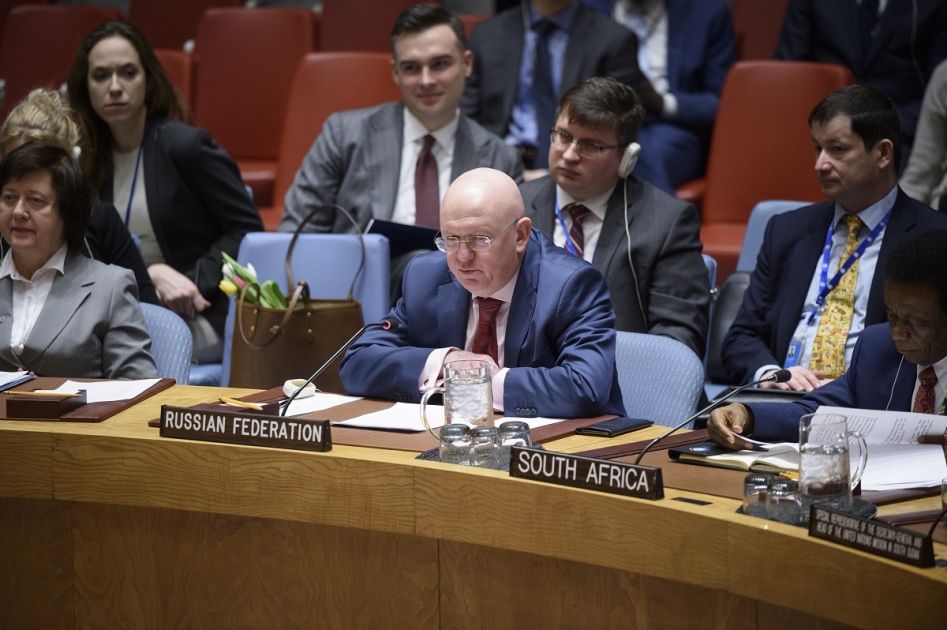Statement by Permanent Representative Vassily Nebenzia at the UN Security Council Meeting on South Sudan
Mm. President,
At the outset let me congratulate you personally and all the women – employees of the UN Secretariat and the missions accredited to the UN on the International Women’s Day. This is the occasion on which my colleagues gave you flowers, because there is such a tradition in Russia.
It is quite symbolic that the background for this holiday developed here in New York, when on March 8, 1857, women went out to the streets and started protests to demand equality with men. It appears that for this holiday we should be thankful to our German colleagues, and to my friend Christoph Heusgen, because it was their compatriot, Clara Zetkin, who in 1910 suggested establishing this holiday. We have historically been very attentive to our women. We were one of the first to start celebrating this day, it was as early as in 1913. After the October Revolution of 1917, our country was among the leaders in the women’s movement. It was in 1965 that the Soviet republics proclaimed March 8 to be a national holiday. However, they did not stop at that and enhanced their efforts to empower women. A few years later those efforts became international. We are very happy that since 1975 the UN has also started to celebrate the International Women’s Day.
Since then Russia and the entire world have done a lot to achieve gender equality and promote the empowerment of women. However, there is still much work ahead. Russia continues efforts to empower women and create equal rights and opportunities for men and women. At the same time, we appreciate our ladies for their womanhood, tenderness and sometimes for the fragility, and we do not try to compete with them in this. We believe that the gender harmony and complementarity have traditionally laid down the basis for the Russian society.
Now let me get back to the agenda of our meeting. We thank Special Representative of the Secretary-General David Shearer and Mm. Angelina Jial for the information on the situation in South Sudan, as well as on the course of South Sudan peace process.
When looking back at the previous year, we believe that it was marked by the peace agreement that the sides to the conflict in South Sudan managed to reach. It is vital that South Sudanese sides demonstrated their preparedness for a compromise, and commitment to overcome disputes.
We welcome the significant progress that was outlined by the implementation of the agreements, and take notice of the development and start of operation of structures and mechanisms, envisaged by the agreement. We commend that after a new agreement was signed, there has been a considerable drop in violence and in a number of cases of human rights violations in the country. There are more and more refugees and IDPs who express their wish to return to places of their permanent residence.
We link this to the implementation of mutual confidence measures, and contacts that the opposing sides establish “on the ground”. It is important that thanks to the security conditions, created by the authorities, opposition politicians are already getting back to the country and have the freedom to move across it. We also take notice of the intension of the opposition leader Riek Machar to return to Juba soon.
We join the address to the sides in South Sudan to finalize the agreements on security issues, and the process of introducing amendments to the constitution. We proceed from the assumption, that complete and all-encompassing compliance with the obligations that the sides took upon will help improve mutual trust of the sides and prevent recurrence of mistakes that had once been made during South Sudanese settlement.
Mm. President,
We would like once again to express our appreciation to the IGAD countries, who initiated and ensured a meaningful negotiations process in Khartoum in June – August, and the signing of documents, that have become crucial for the entire settlement process. We give a high assessment to the personal contribution of the President of Sudan, Omar al-Bashir, to the achievement of peaceful agreements.
We highlight, that the unity of approaches that the region demonstrated when addressing the South Sudanese settlement, still remains in place to follow up the peace process, and this is extremely important.
We do not share the opinion of our colleagues, that the progress in South Sudan was sustained by the increased sanction pressure on South Sudan and by introduction of arms embargo. The Council should not claim credit for the achievements of regional mediators, who, by the way, were against any additional measures for South Sudanese sides. We urge to face the truth: it is the arms embargo that prevents the regional organizations from being able to react flexibly with the help of their own initiatives in the area of security.
We welcome the commitment of the guarantors to the agreement to implement peaceful arrangements by assigning national contingents of Sudan, Uganda, Djibouti and Somalia to become part of the Regional Protection Forces. We believe this is the practical application of the principle “African solutions for African problems”, and a good opportunity for effective cooperation between the UN and its Security Council, and the regional organizations. We stand ready to consider any targeted proposals of the organization regarding the Regional Protection Forces after the sides in South Sudan come up with some concrete agreements on security issues.
The Russian delegation supports the extension of the UNMISS mandate. We are prepared to work constructively on the text of a corresponding resolution.
Thank you.
